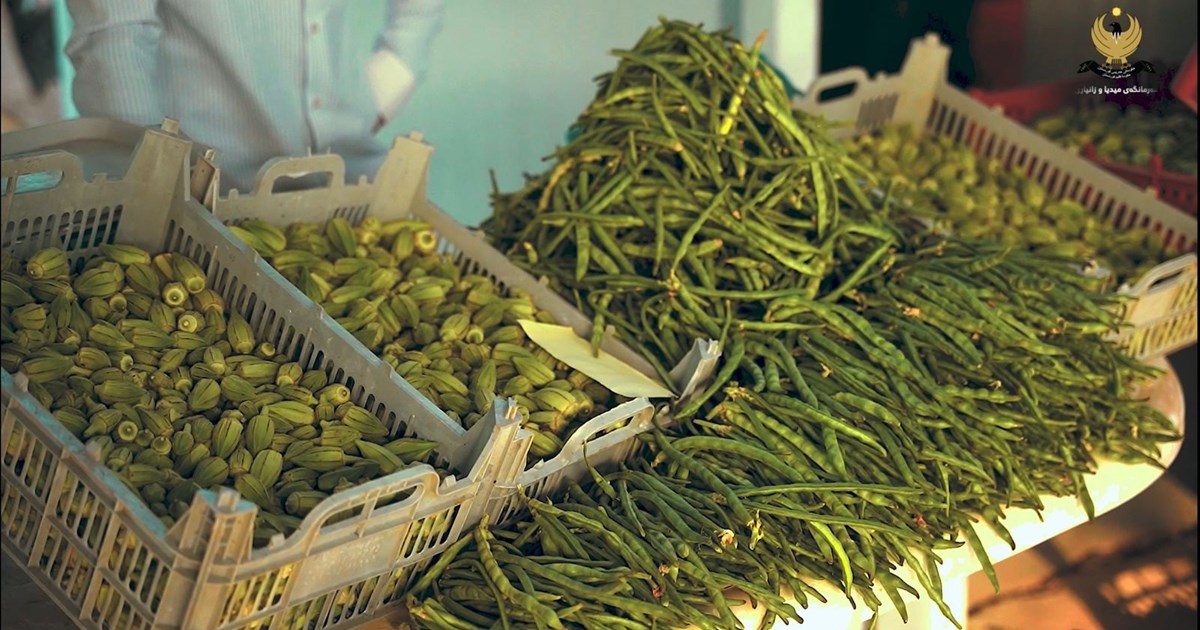Halabja’s Weekly Market Champions Local Farmers, Boosting Economy Amidst Kurdistan’s Agricultural Boom
Halabja’s new weekly market empowers farmers and boosts the economy, part of Kurdistan’s agricultural boom. Backed by KRG policies, the region exports 3,000+ tons of produce daily through investment, global partnerships, and a focus on food security.

ERBIL (Kurdistan24) – In a vibrant display of the Kurdistan Region's agricultural resurgence, a new weekly market in Halabja province is successfully connecting local farmers directly with consumers, bolstering the local economy and championing the rich bounty of the region's produce. Held every Friday, the market has become a bustling hub where the season's harvest, from fresh vegetables to ripe fruits, is in high demand, reflecting a broader, government-backed movement to prioritize and market domestic agricultural products.
The market, strategically designed to support the region's farmers, provides a dedicated platform for them to sell their goods at prices that are fair for both producers and buyers.
This initiative not only ensures that residents have access to fresh and healthy local products but also contributes to strengthening the local economy and attracting tourism.
The supervisor of the weekly market, Sumaya Nouri, confirmed to Kurdistan24 that the Friday market presents "a very good opportunity to sell local agricultural products and generate a good income for farmers."
This sentiment was echoed by the farmers themselves, one of whom described arriving early in the morning to sell a variety of produce, including okra, tomatoes, peppers, figs, plums, and pomegranates, which brings them a "good income."
The popular market is scheduled to continue every Friday until the end of the summer harvest season.
This grassroots initiative in Halabja is a microcosm of a much larger, region-wide agricultural transformation driven by the Kurdistan Regional Government (KRG) under the ninth cabinet.
The government has identified agriculture as a central pillar of its economic diversification strategy, a crucial move to reduce reliance on volatile oil revenues and enhance food security. This strategic focus has led to a remarkable surge in production and, for the first time in recent history, a significant and growing export market for Kurdish produce.
As Kurdistan24 reported on August 24, 2025, the Kurdistan Region is now exporting more than 3,000 tons of locally produced fruits and vegetables daily.
According to Hemin Sayed Murad, Director General of Agriculture in Erbil, staples like tomatoes, onions, and cucumbers make up the bulk of these shipments, which are destined for markets across federal Iraq.
"All these products flooding the markets are from our own farmers and exceed local demand, which is why exports are permitted without restrictions," Murad explained, confirming that nearly 250,000 tons of Kurdish farm produce had already been exported since the start of the season.
This success is the result of sustained investment in farming infrastructure, modern irrigation techniques, and robust support for farmers and traders.
The government has actively worked to remove bureaucratic hurdles and ensure that Kurdish products can move freely to external markets. This export drive is a cornerstone of a broader economic vision that also includes bolstering the tourism and manufacturing sectors to create a more resilient and balanced economy.
The agricultural revival has also been bolstered by strong international partnerships.
The Netherlands, a global leader in agricultural technology, has been a key partner for over a decade. Dutch Consul General in Erbil, Adriaan IJsselstein, recently highlighted the dramatic results of this cooperation, particularly in potato production, which has skyrocketed from 2,000 tons a year to over 600,000 tons.
"This project is important for the farming sector in the Kurdistan Region because it creates thousands of jobs," IJsselstein told Kurdistan24, emphasizing its contribution to both employment and food security. The partnership is now expanding to other areas, including vegetable and dairy production.
In addition to international collaboration, the KRG has successfully fostered public-private partnerships to support local farmers. For the fifth consecutive year, private companies have played a vital role in marketing the region's wheat harvest, providing a crucial outlet for farmers beyond government purchases.
This initiative ensures that "the farmers' efforts do not go to waste," as one farmer put it, by absorbing hundreds of tons of high-quality wheat for processing into flour and other consumer products.
The diversity of the Kurdistan Region's agricultural output is another key strength.
From the unique, 150-year-old heirloom tomato seeds preserved by farmers in Garmian's Faqe Mustafa village to the booming sumac production in Duhok, which officials have dubbed the "red gold of Kurdistan," the region is cultivating a reputation for high-quality, specialty products.
Duhok province, which is Iraq's top grape producer, is anticipating a 60,000-ton harvest this year, with new processing factories finally solving the long-standing problem of market surplus. This move from raw cultivation to value-added processing is a critical step in maximizing the economic potential of the sector.
Festivals and exhibitions across the region, such as the Taq Taq Fig Festival and the Ankawa Grape Exhibition, have also become vital platforms for marketing local products and boosting agritourism.
The Taq Taq festival, for instance, drew over 20,000 tourists and saw farmers sell out of 15 tons of figs within hours. These events not only provide a direct market but also help build a strong brand identity for Kurdish produce.
The strategic vision of the KRG, championed by Prime Minister Masrour Barzani, has also attracted significant foreign investment. Following high-level visits to the United Arab Emirates, several UAE-based companies have launched large-scale agricultural projects in Zakho, focusing on a wide range of crops. These projects, valued in the billions of Iraqi dinars, are set to further boost domestic production, create jobs, and strengthen the regional economy.
From the bustling weekly market in Halabja to the large-scale export operations and international partnerships, the message is clear: the Kurdistan Region's agricultural sector is not just recovering—it is thriving. By empowering its farmers, investing in infrastructure, and opening up new markets, the KRG is cultivating a sustainable and prosperous future, rooted firmly in the rich soil of its land.